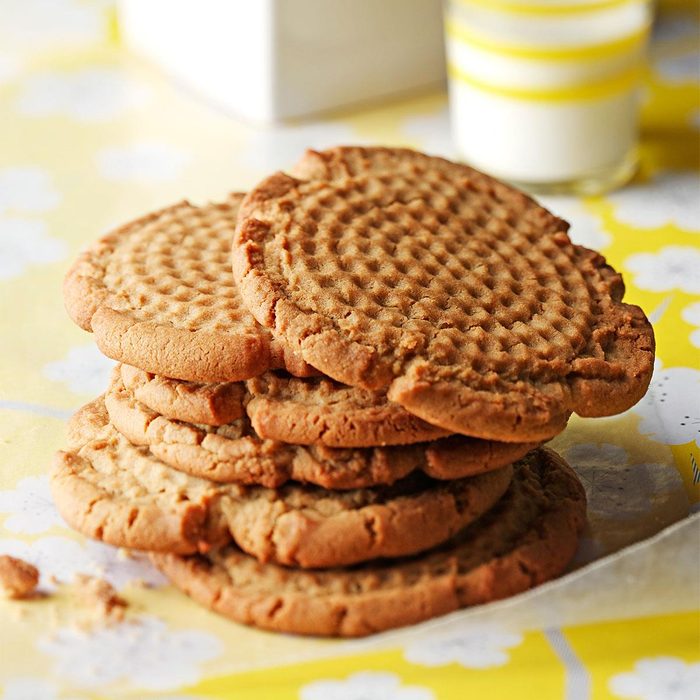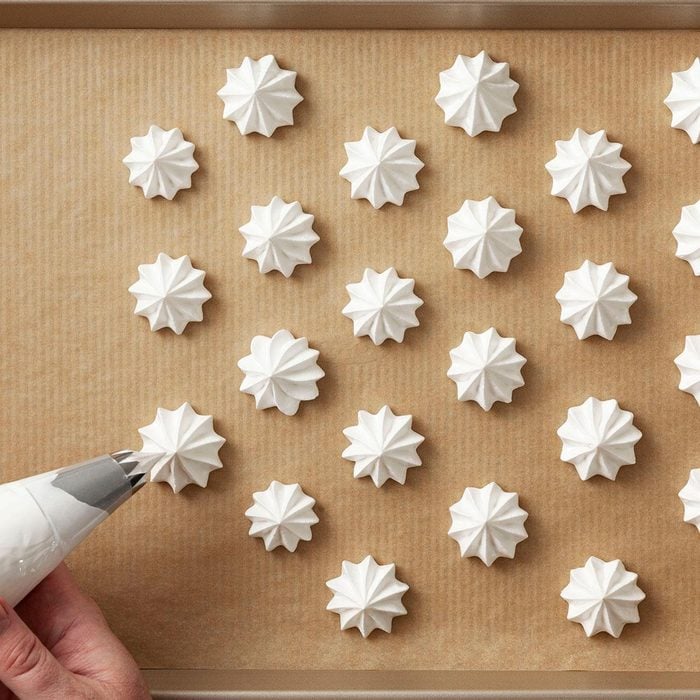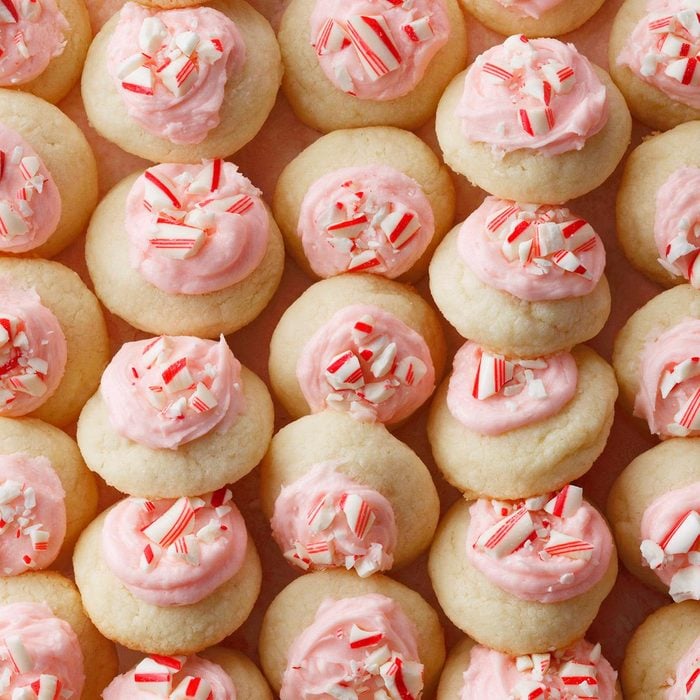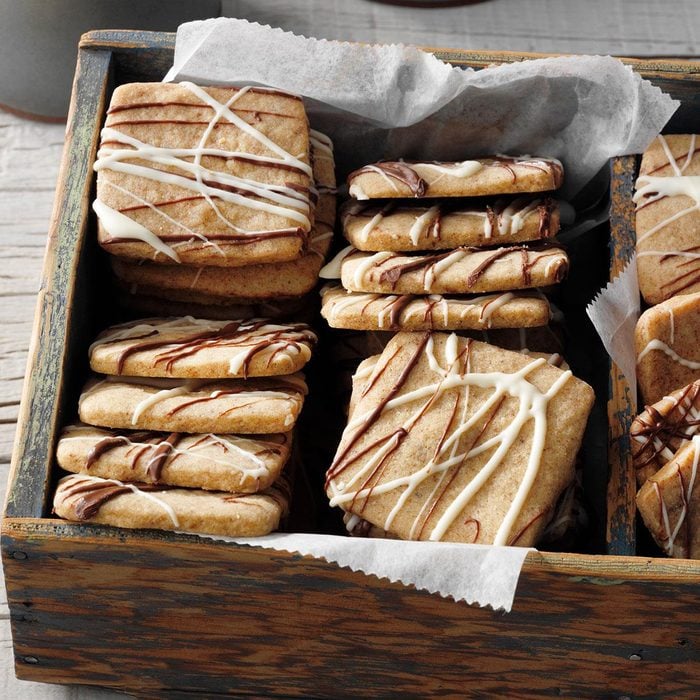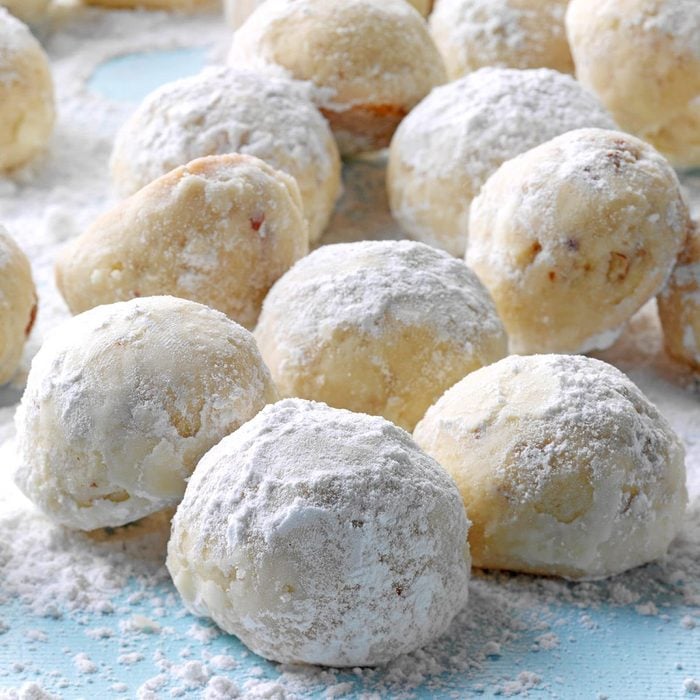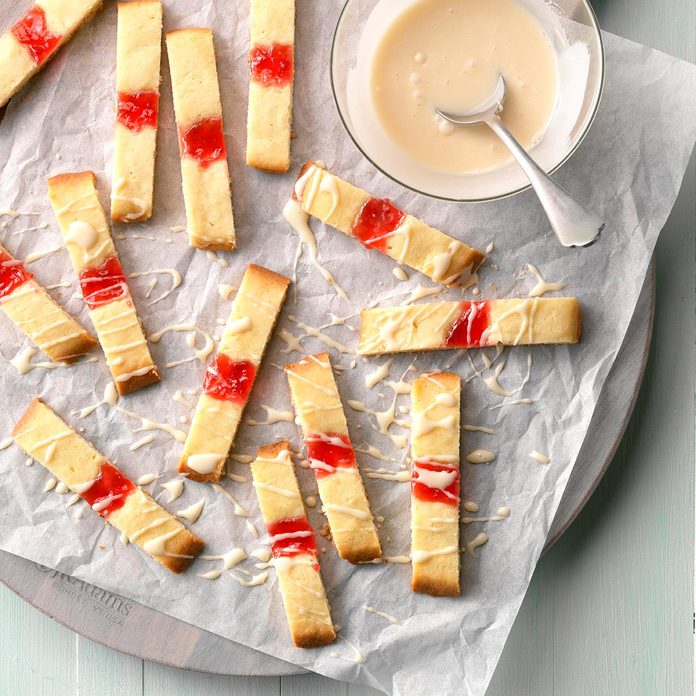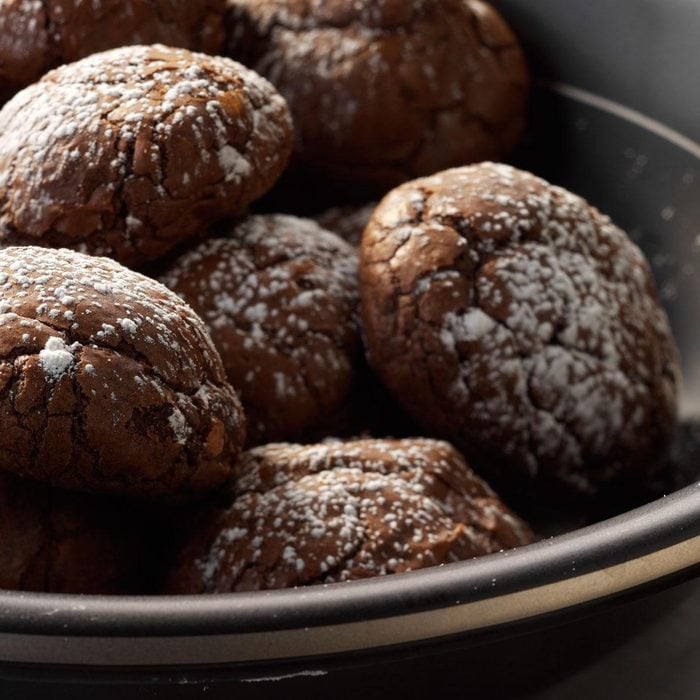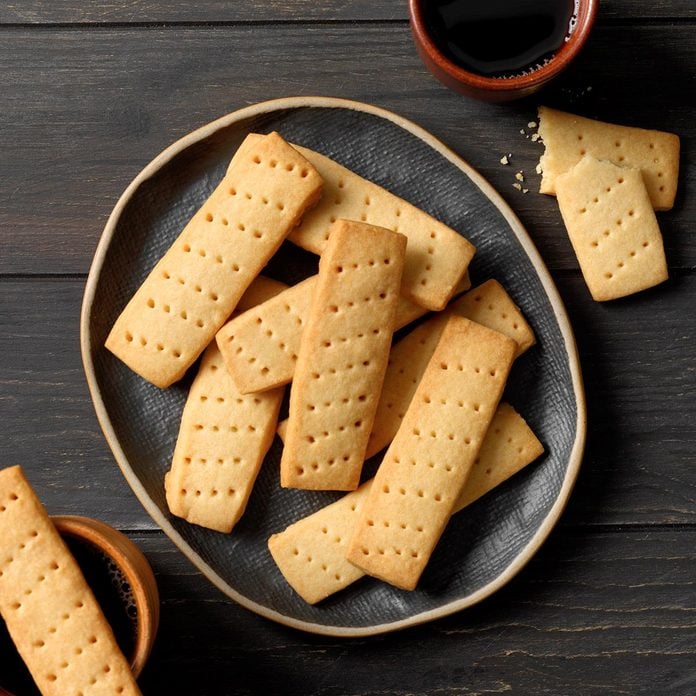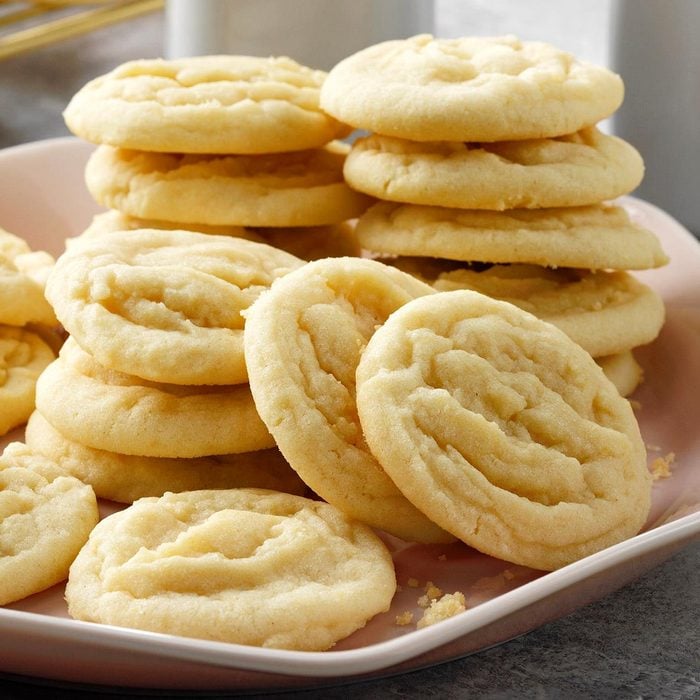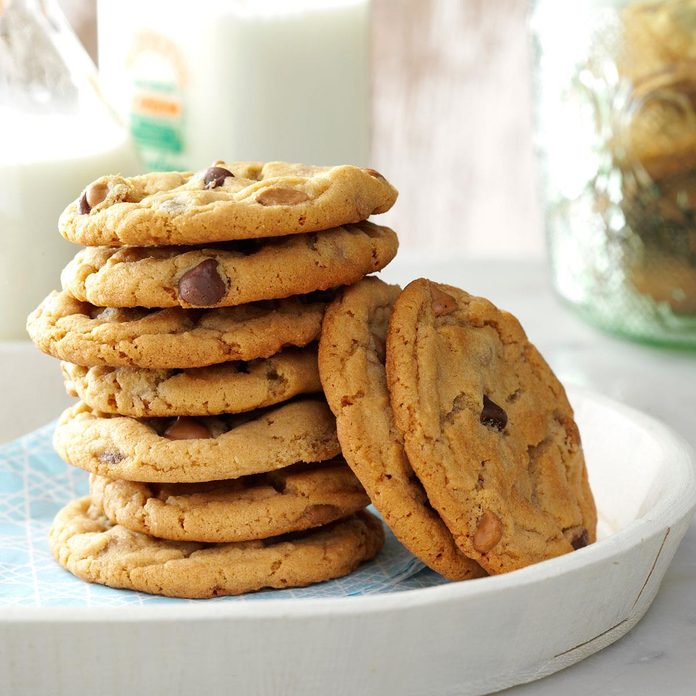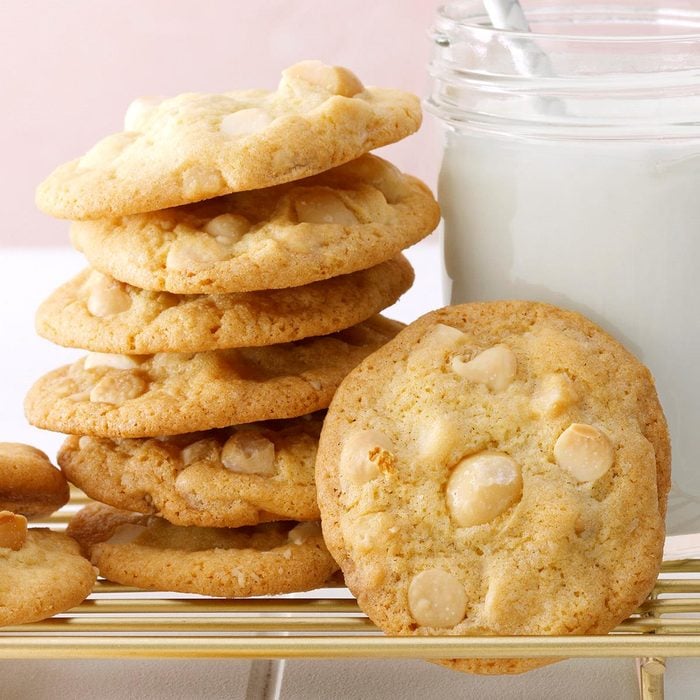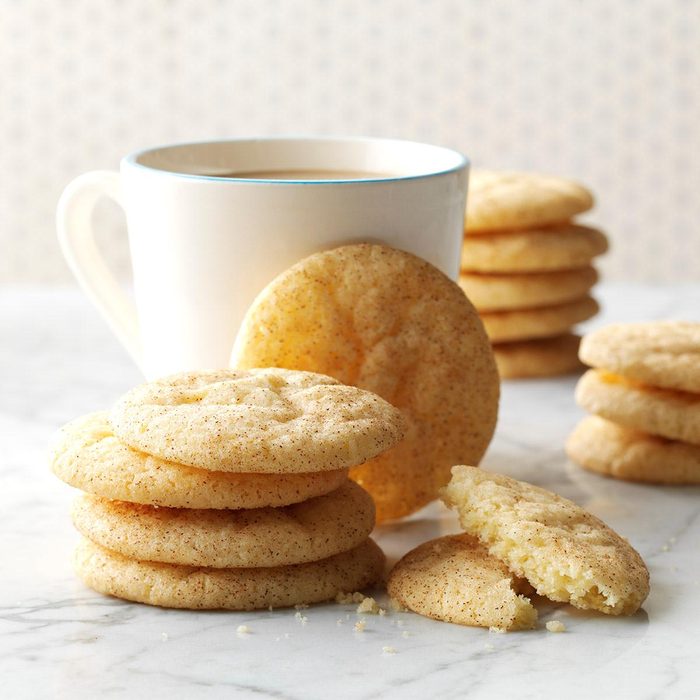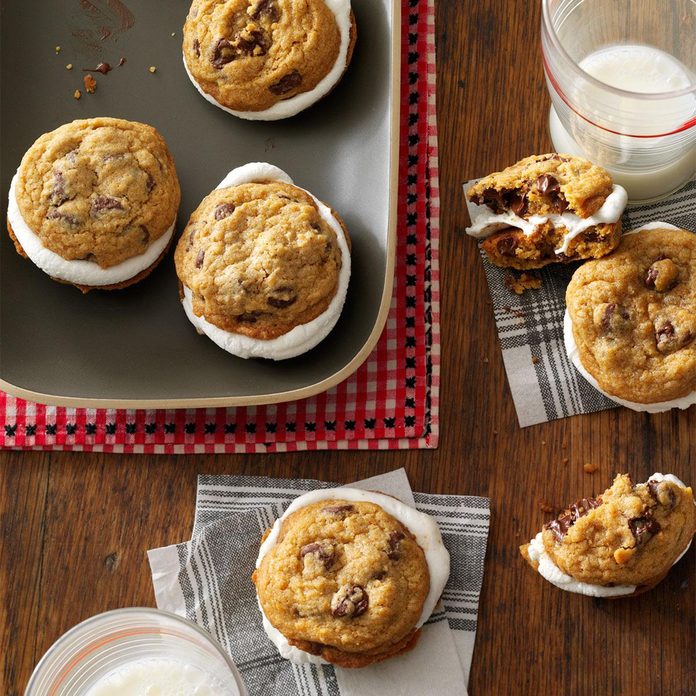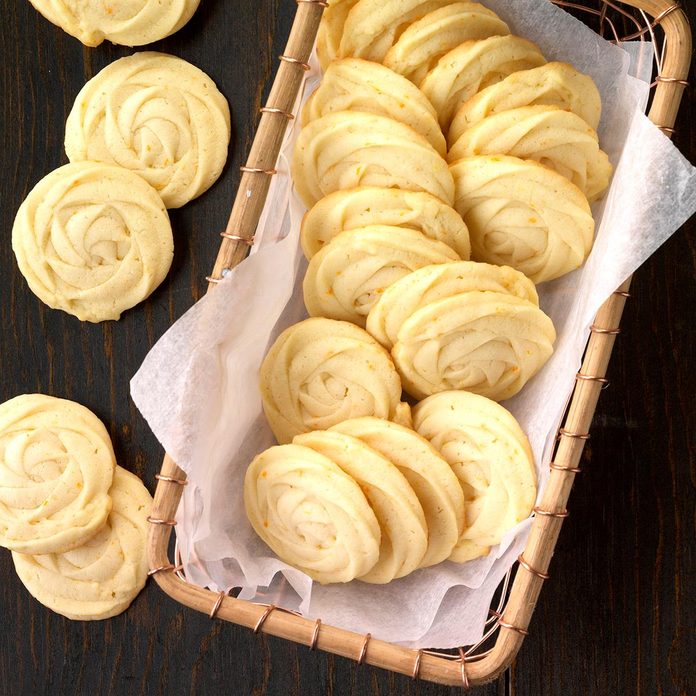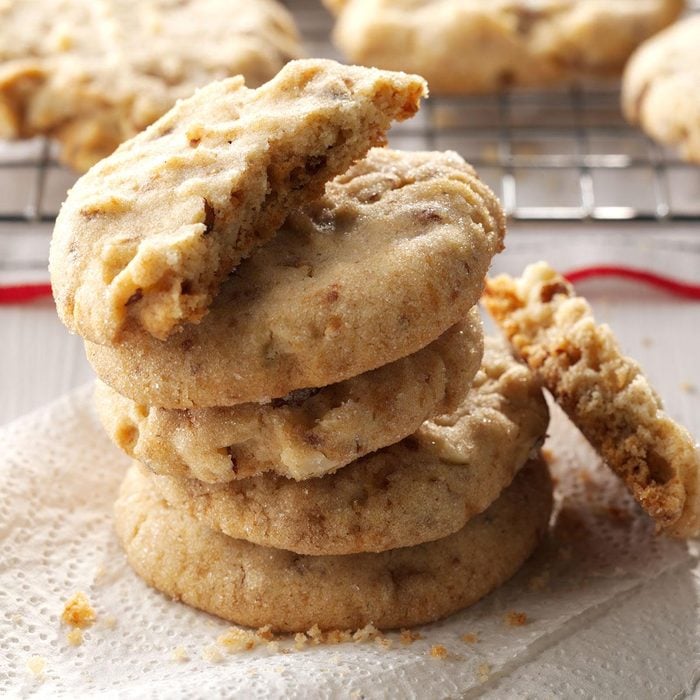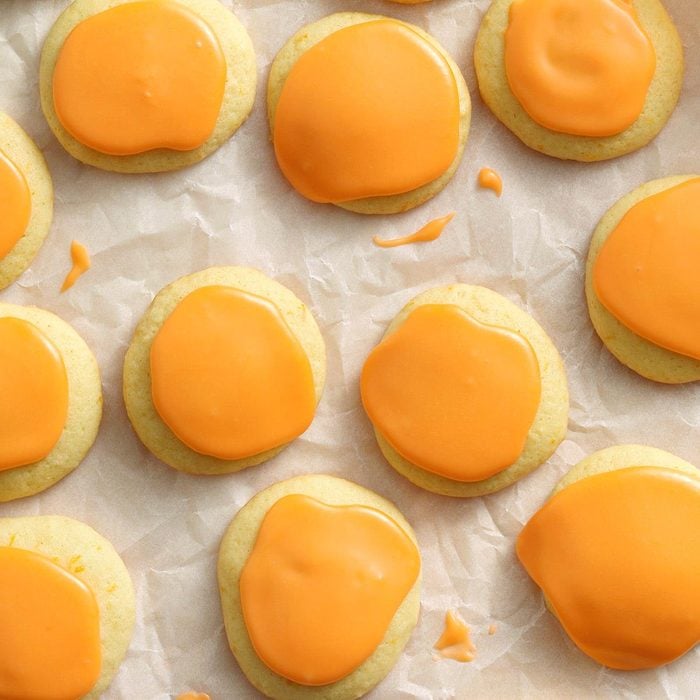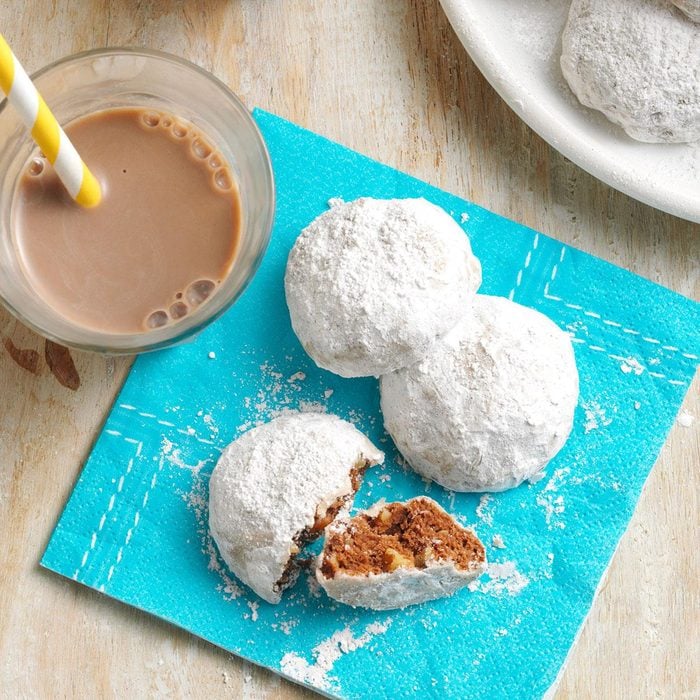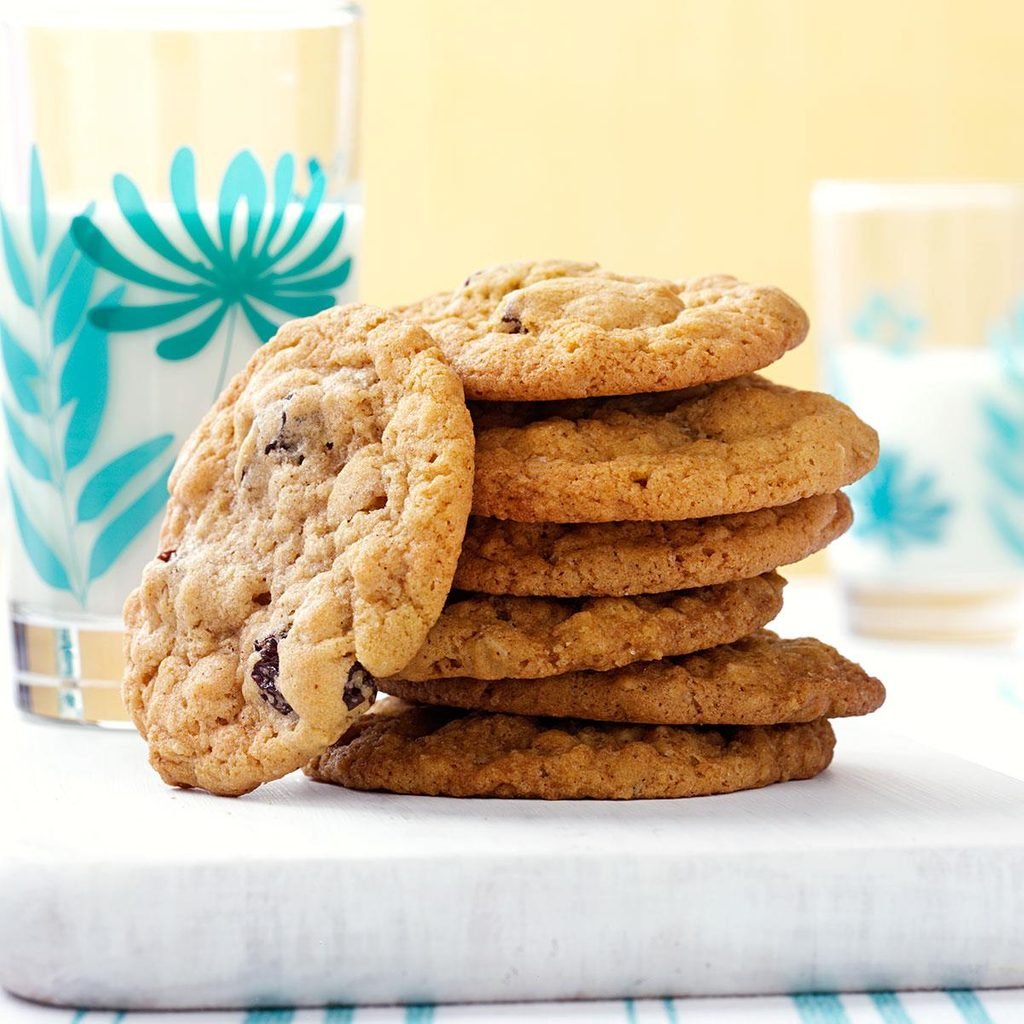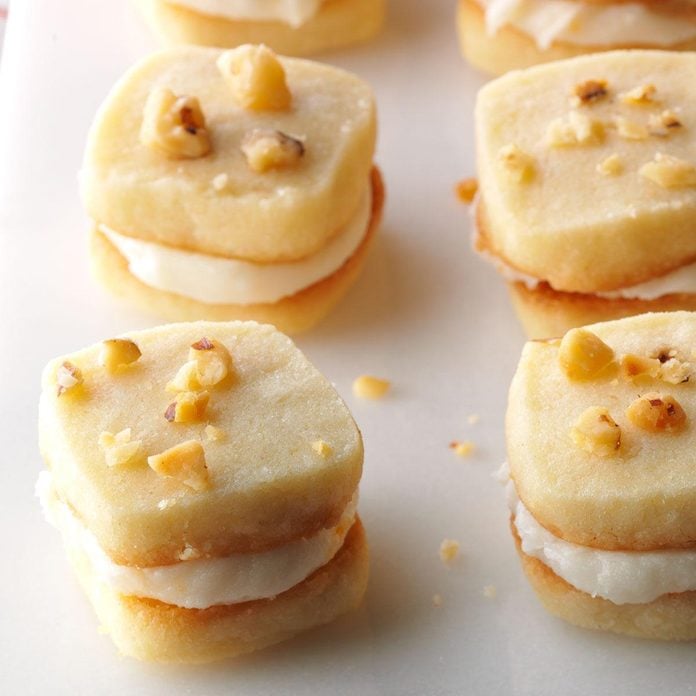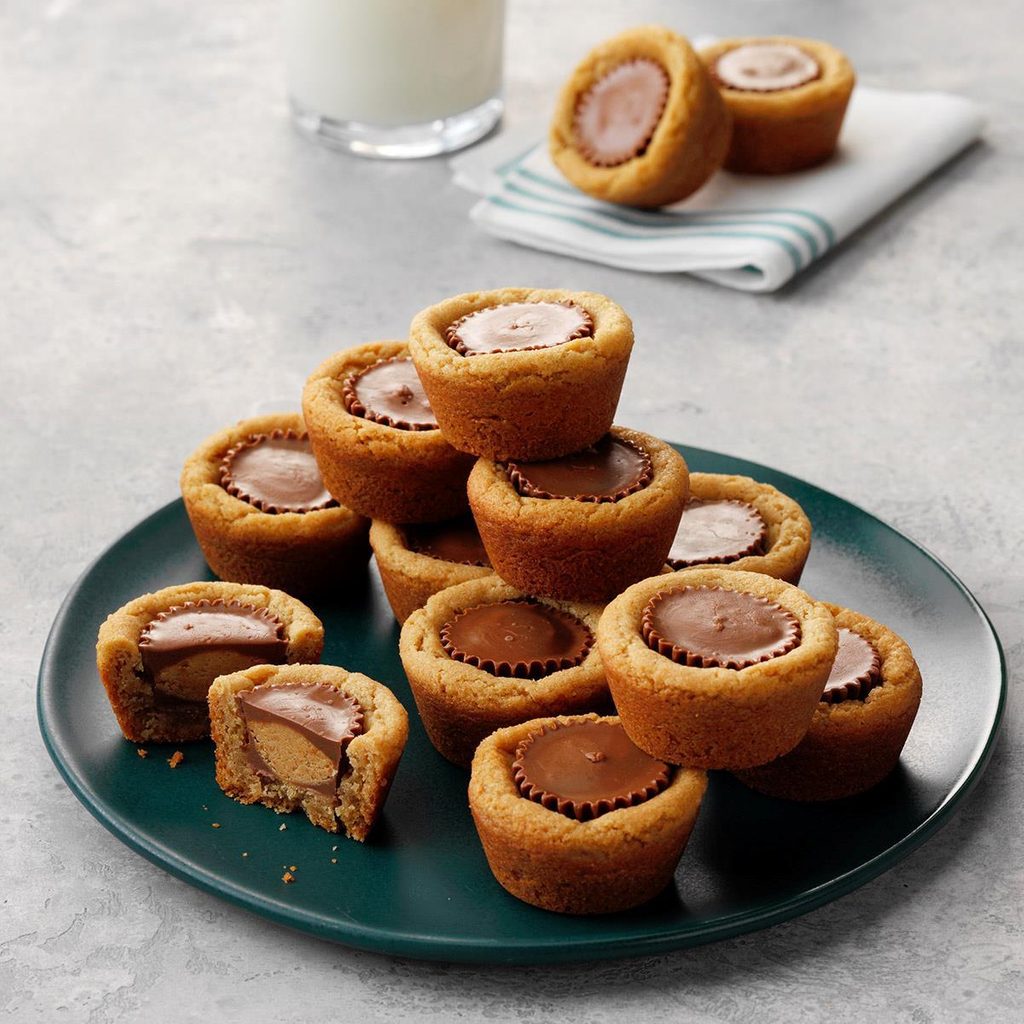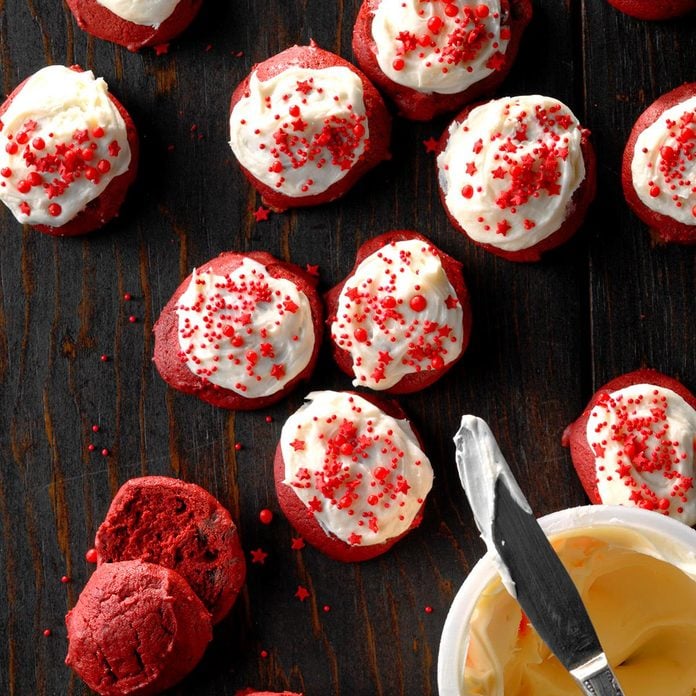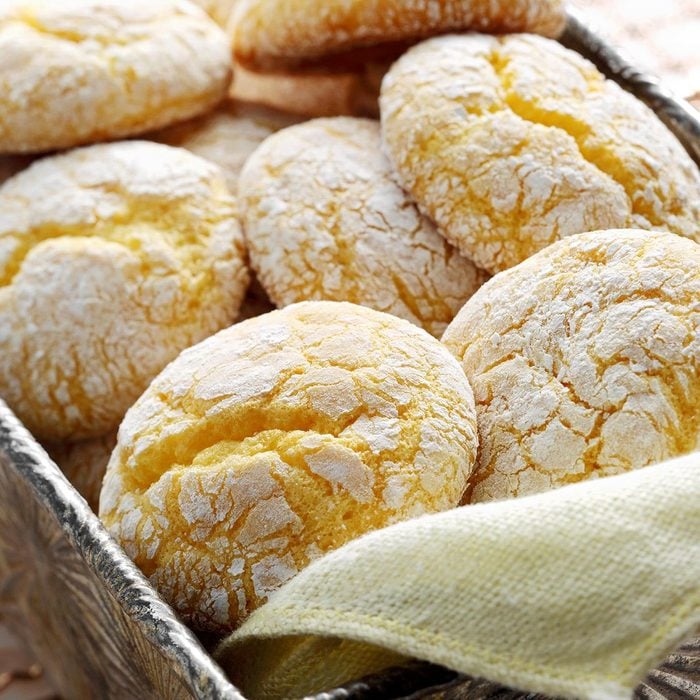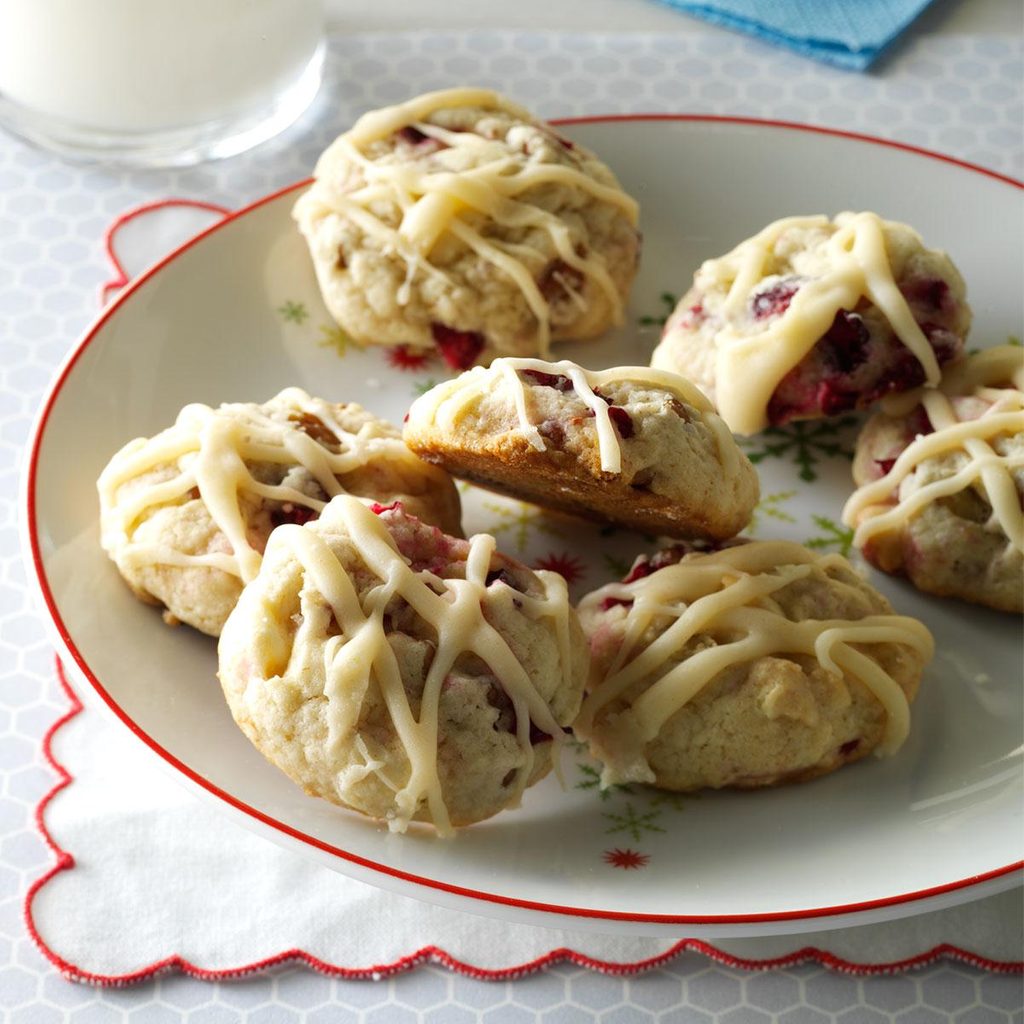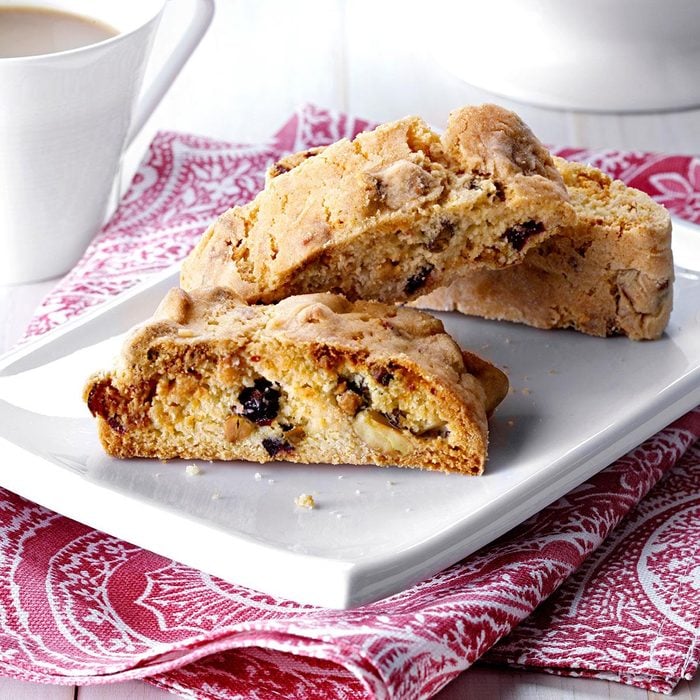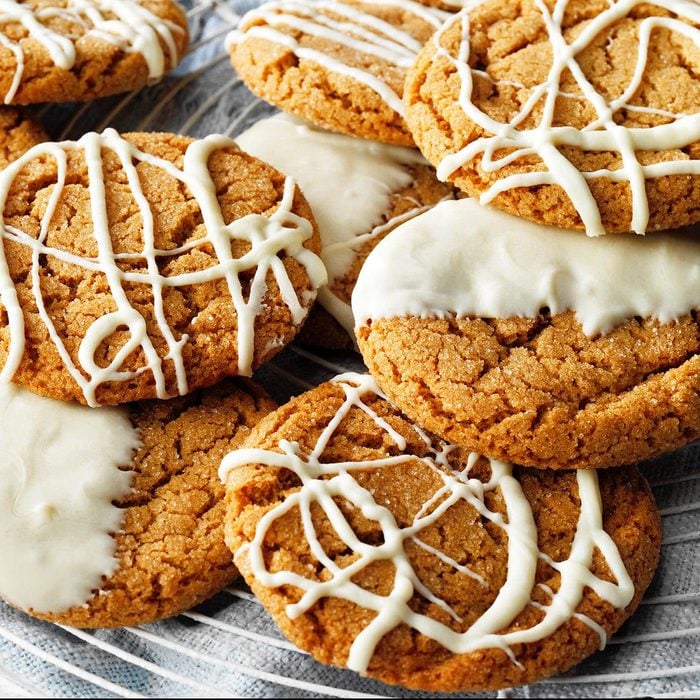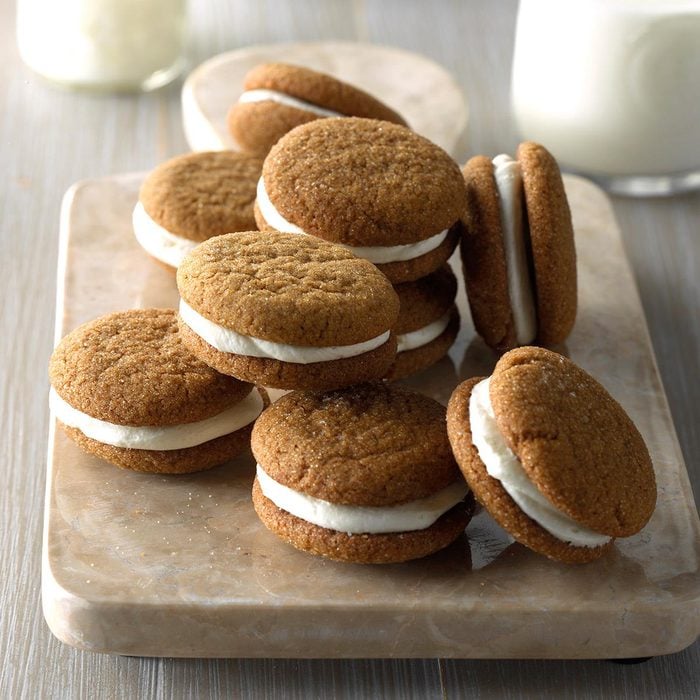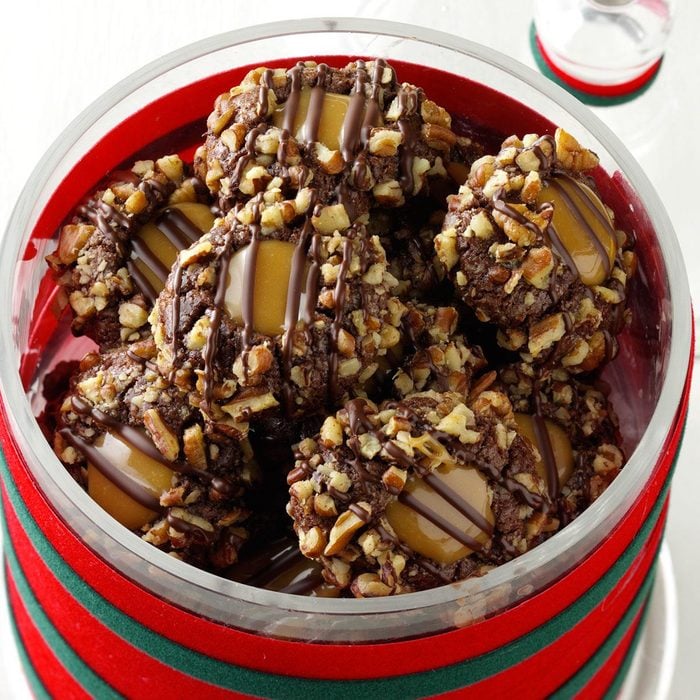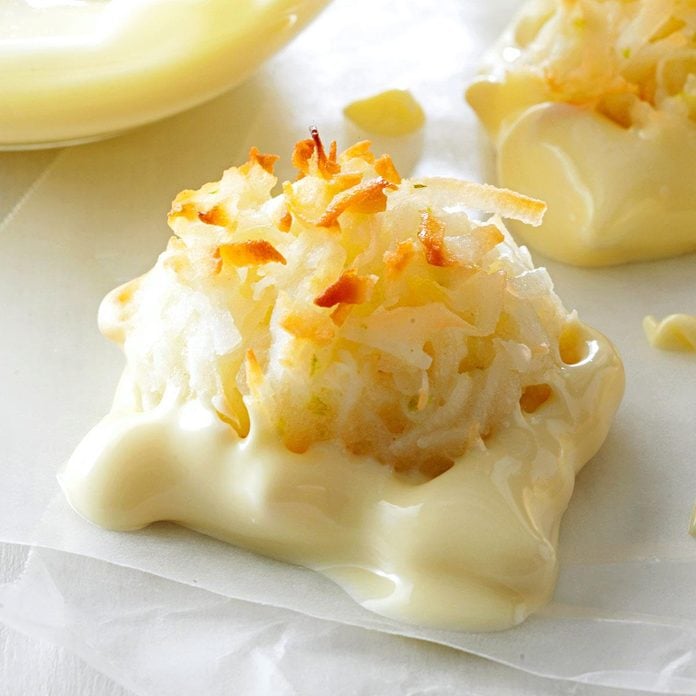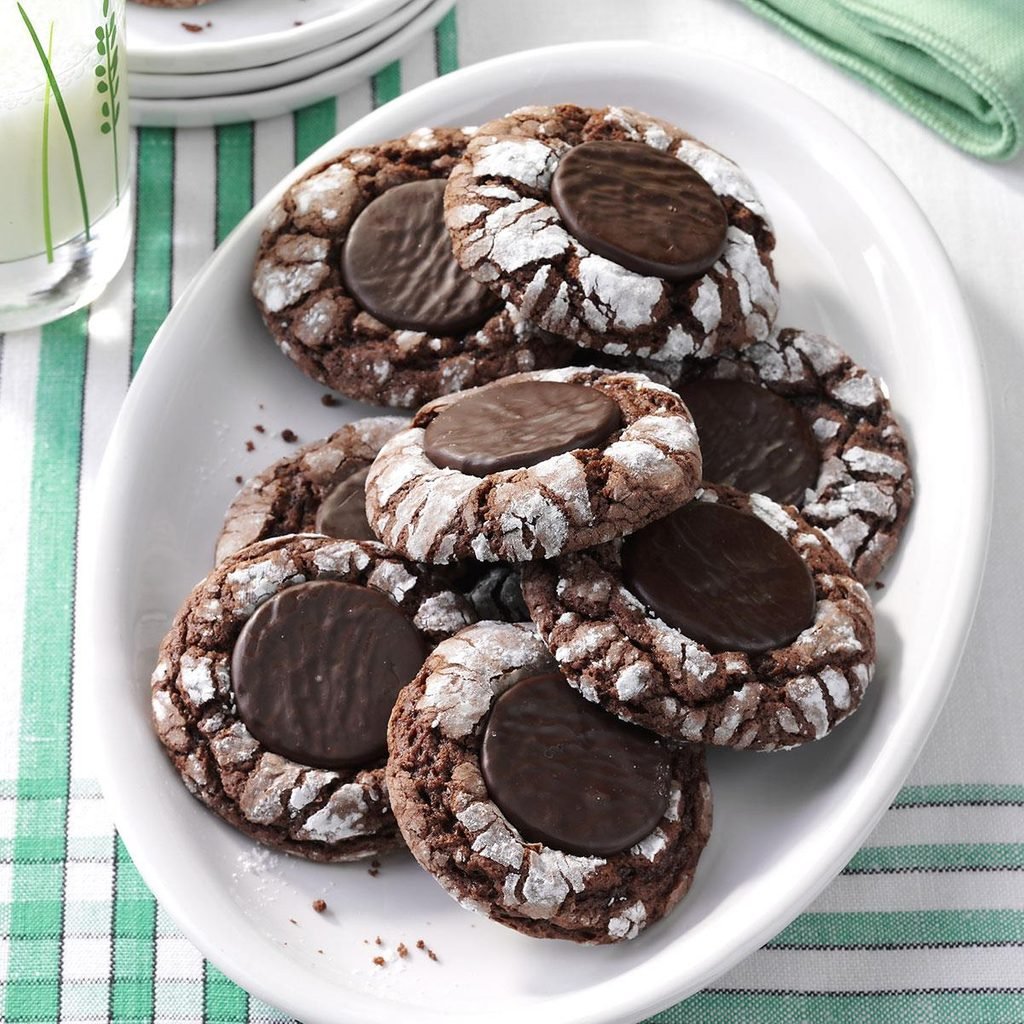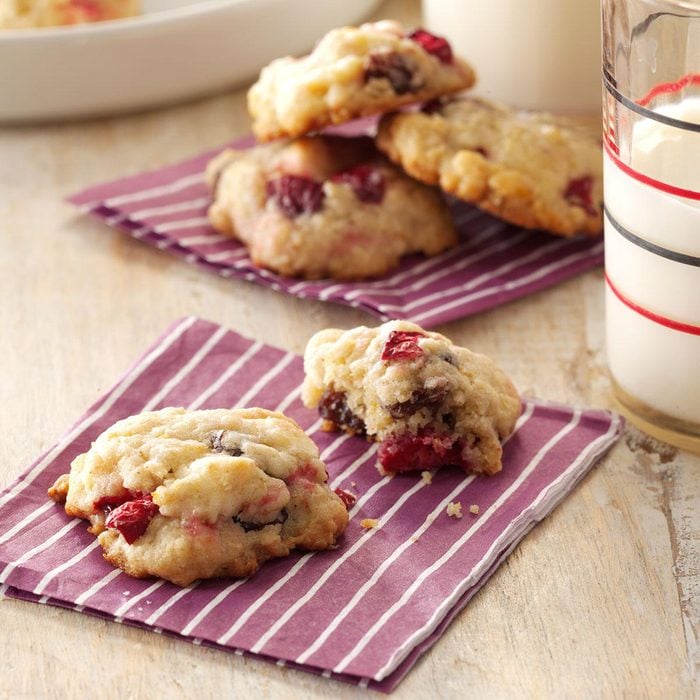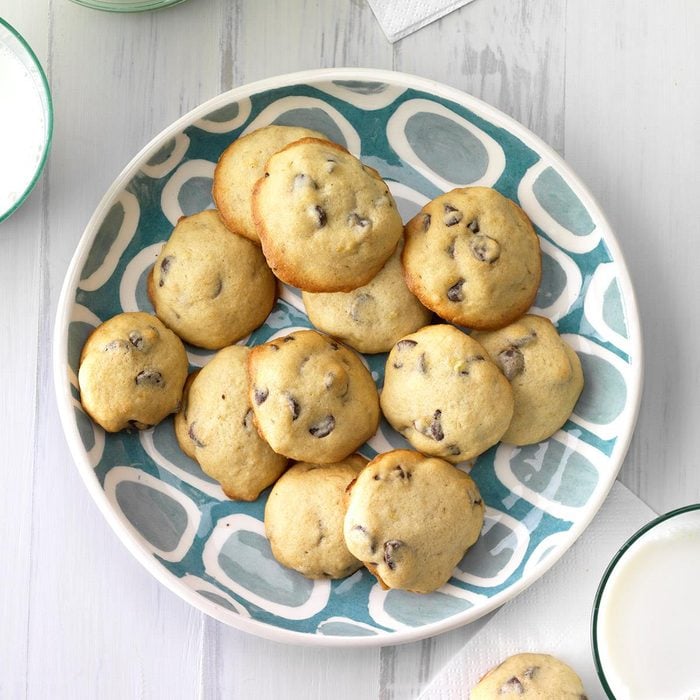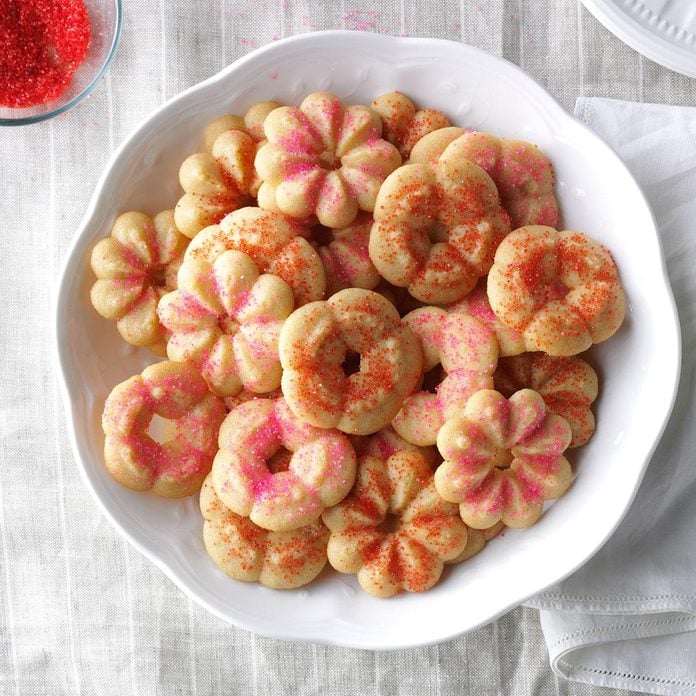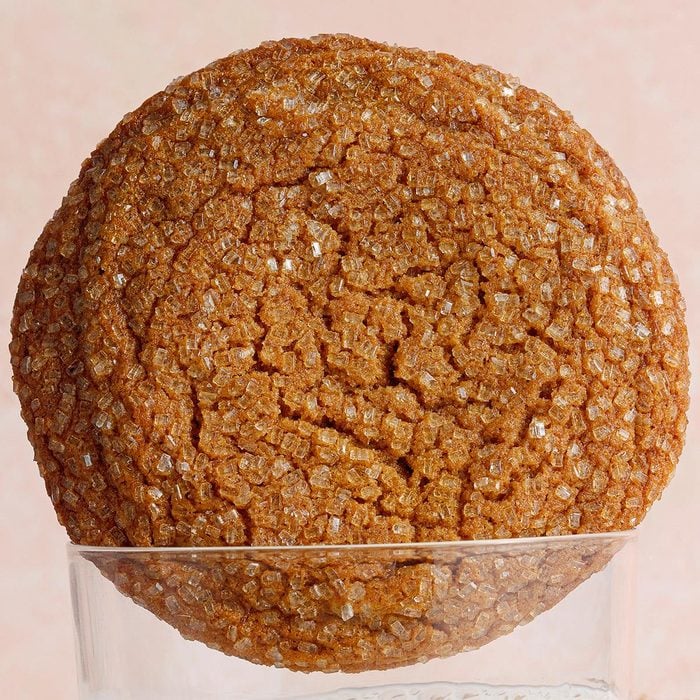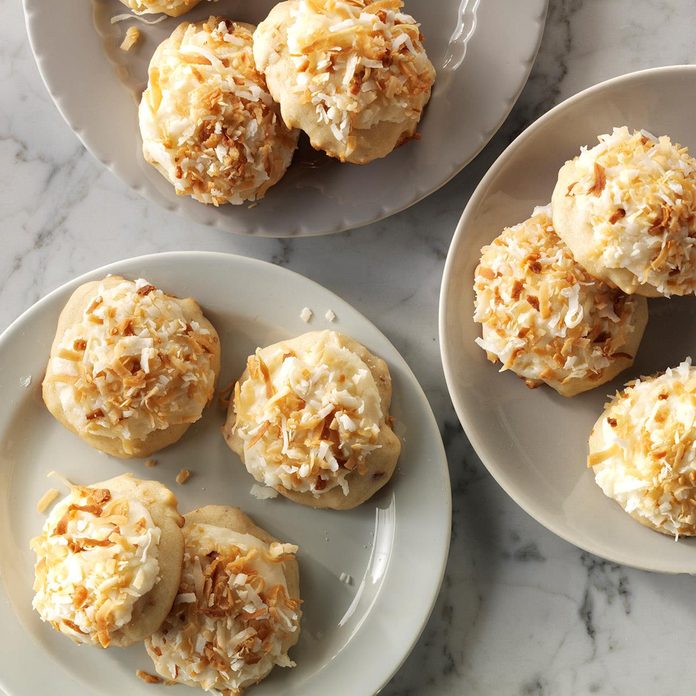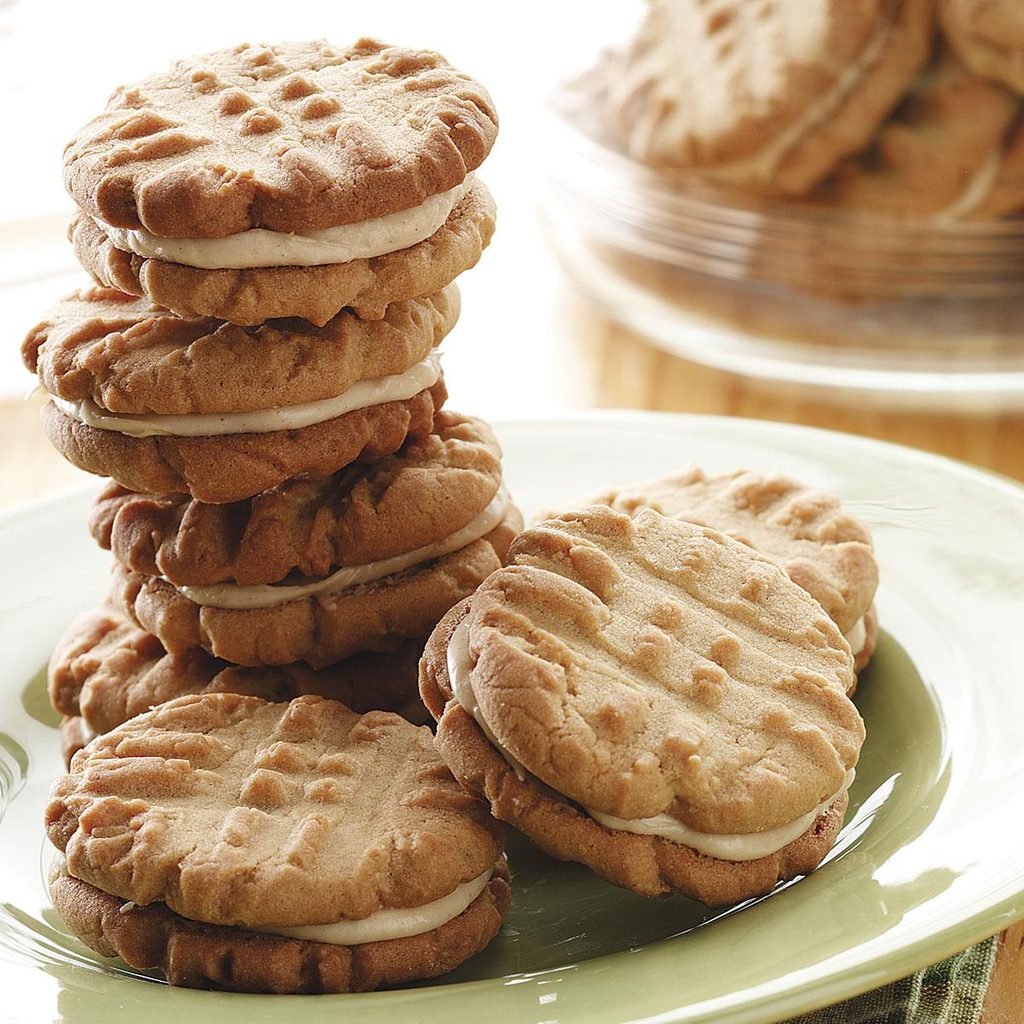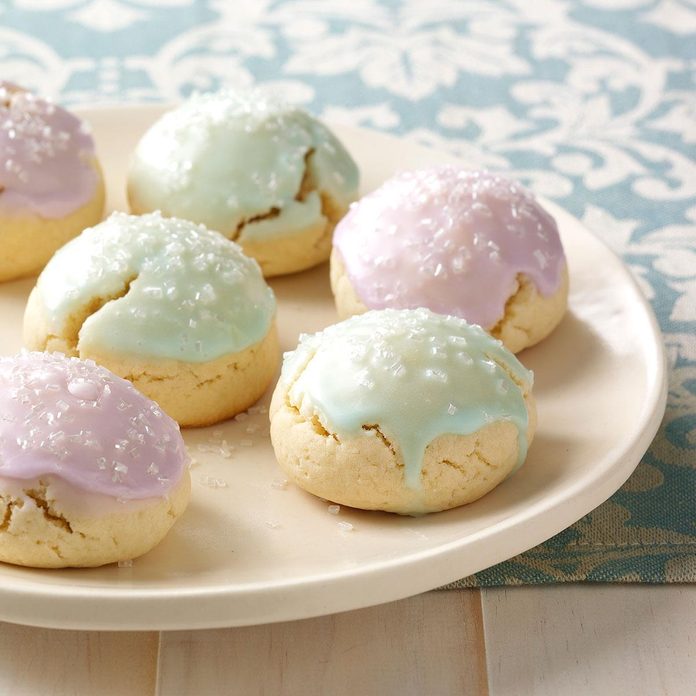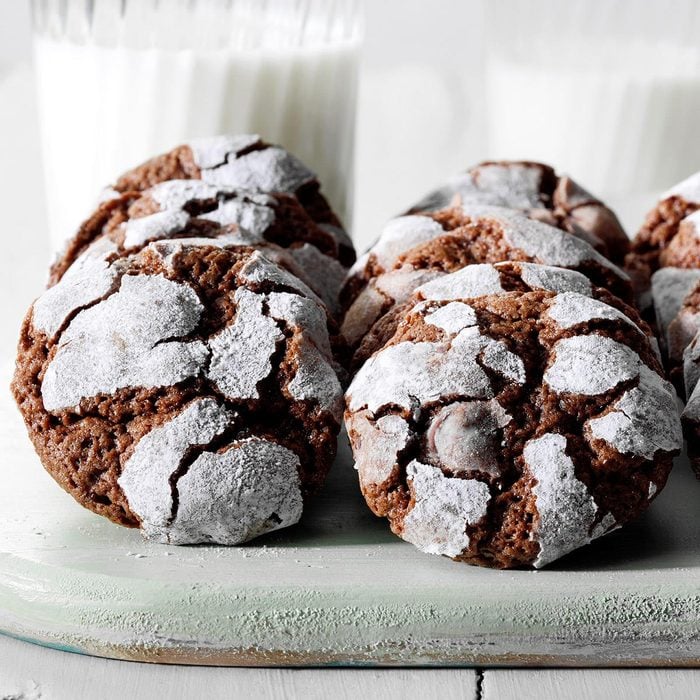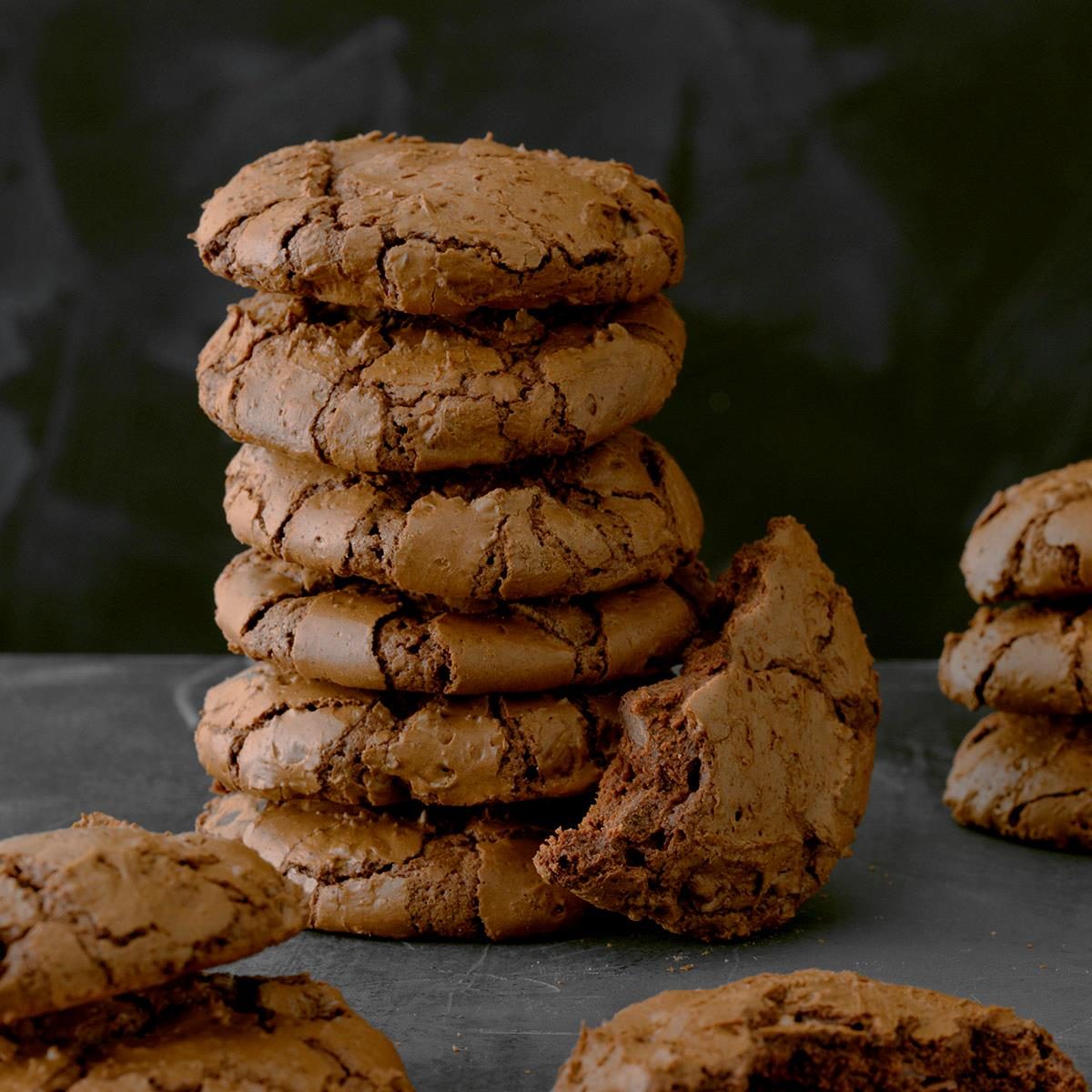 Jumbo Brownie Cookies
Total Time:
Jumbo Brownie Cookies
Total Time: 35 minutes
Main Ingredients: Chocolate baking chips, chocolate chunks, butter, eggs, all-purpose flour
Level: Intermediate
Go to Recipe
Get your
essential cookie-baking supplies ready to make these cookie recipes. Then, make these deeply fudgy cookies for any party or potluck—or just for you. The trick is adding a little espresso powder to the dough to really bring out the chocolate flavor.
Take these deeply fudgy cookies to a party, and you're sure to make a friend. A little espresso powder in the dough makes them over-the-top good. —Recipe contributor Rebecca Cababa, Las Vegas, Nevada
Old-Fashioned Peanut Butter CookiesTotal Time: 25 minutes
Main Ingredients: Shortening, peanut butter, brown sugar, eggs
Level: Intermediate
An easy recipe made with pantry staples, this is the kind of cookie to whip out when you just feel like making cookies. Readers suggest using natural peanut butter for a more peanut-y taste and trying pressing it with a glass with a decorative bottom instead of crisscrossing it with a fork.
My mother insisted that my grandmother write down one recipe for her when Mom got married in 1942: the how to make peanut butter cookies from scratch recipe. That was a real effort because Grandma was a traditional pioneer-type cook who used a little of this or that until it felt right. This treasured recipe is the only one she ever wrote down! —Recipe contributor Janet Hall, Clinton, Wisconsin
Vanilla Meringue CookiesTotal Time: 1 hour
Main Ingredients: Egg whites, cream of tartar, sugar
Level: Intermediate
Meringue cookies are delightfully sweet and light, and they can be made into so many different flavors (although vanilla is just perfect). If you haven’t worked with meringue too much, there are lots of helpful tips—like making sure the egg whites are room temperature—to make these just right.
These sweet little swirls are light as can be. They're all you need after a big, special dinner. —Recipe contributor Jenni Sharp, Milwaukee, Wisconsin
First-Place Coconut MacaroonsTotal Time: 30 minutes
Main Ingredients: Sweetened coconut, egg whites, flour, sugar
Level: Intermediate
When baking coconut macaroons, it’s important to control the moisture so they don’t spread too much on the cookie sheet. You’ll have nice and craggy, chewy cookies in no time.
These coconut macaroon cookies earned me a first-place ribbon at the county fair. They remain my husband's favorites—whenever I make them to give away, he always asks me where his batch is! I especially like that this recipe makes a small enough batch for the two of us to nibble on. —Recipe contributor Penny Ann Habeck, Shawano, Wisconsin
Peppermint MeltawaysTotal Time: 40 minutes
Main Ingredients: Peppermint extract, peppermint candies, confectioners' sugar
Level: Intermediate
These festive cookies are a great addition to any Christmas cookie platter or gift box. And it’s right there in the name: These little pepperminty treats simply melt in your mouth.
This recipe for peppermint meltaways is very pretty and festive-looking on a cookie platter. I often cover a plate of these peppermint cookies with red or green plastic wrap and a bright holiday bow in one corner. And yes, they really do melt in your mouth! —Recipe contributor Denise Wheeler, Newaygo, Michigan
Peanut Butter Kiss CookiesTotal Time: 30 minutes
Main Ingredients: Peanut butter, milk chocolate kisses, egg, sugar
Level: Intermediate
You only need five ingredients and a short amount of time to make these classic peanut butter-and-chocolate treats. While milk chocolate kisses are the standard, you can experiment with other flavors, like white chocolate swirled kisses.
Everyone who tries these beloved gems is amazed that they use only five ingredients. Baking cookies doesn't get much easier than this. —Recipe contributor Dee Davis, Sun City, Arizona
Coffee ShortbreadTotal Time: 35 minutes
Main Ingredients: Instant coffee granules, semisweet chocolate chips, white baking chips
Level: Intermediate
A crisp, buttery coffee-flavored shortbread drizzled with white and semisweet chocolate is like a morning mocha in cookie form. To keep the dough from sticking on the counter or your rolling pin, tuck it between two sheets of parchment paper for easy smoothing.
When you need a treat for brunch, bake some of these coffee-flavored shortbreads. The chocolate drizzle is surprisingly easy to do. —Recipe contributor Dixie Terry, Goreville, Illinois
Pecan MeltawaysTotal Time: 25 minutes
Main Ingredients: Pecans, confectioners' sugar, butter, flour
Level: Intermediate
To ensure the proper melt-away texture of pecan meltaways, chill your cookie dough like you would for cutout cookies. It will help keep them from spreading too much on the baking sheet.
This sweet, nutty pecan meltaways recipe is a tradition in our house at Christmastime, but the treats are delightful any time of the year. —Recipe contributor Alberta McKay, Bartlesville, Oklahoma
Raspberry RibbonsTotal Time: 40 minutes
Main Ingredients: Raspberry jam, confectioners' sugar, evaporated milk
Level: Intermediate
Like a buttery shortbread with a sweet jam, these “ribbon” cookies make a lovely addition to any dessert table. Because they’re filled with jam and cut after baking, they are more delicate. Shipping these for the holidays or special occasions is not advised.
I make these attractive buttery cookies to serve at our remote guest lodge, and all the cooks in the kitchen are addicted to them! —Recipe contributor Patsy Wolfenden, Golden, British Columbia
White Velvet CutoutsTotal Time: 35 minutes
Main Ingredients: Cream cheese, confectioners' sugar, 2% milk, shortening
Level: Advanced
This super soft and buttery cookie really tastes what white velvet feels like. With cream cheese in the dough, the texture and flavor can’t be beat. They shape easily and the icing can be any color you want, so they’re good year-round!
We make and decorate these cutouts for different holidays and give lots of them as gifts. Last year, we baked a batch a week before Christmas to be sure we'd have plenty to give and plenty for ourselves, too. These rich cookies melt in your mouth. —Recipe contributor Kim Hinkle, Wauseon, Ohio
Contest-Winning Chocolate Truffle CookiesTotal Time: 35 minutes
Main Ingredients: Semisweet chocolate chips, unsweetened chocolate, baking cocoa
Level: Intermediate
The key to getting a puffy cookie with a rich, soft, chocolatey center is chilling the dough for at least three hours; it prevents the cookies from getting too flat while baking. You really want this to be almost truffle-like inside, and the slightly domed shape helps with that.
Here's a snack for serious chocolate lovers. These enticing cookies are crisp on the outside and soft on the inside, somewhat bittersweet and very chocolaty. I usually make them to share at get-togethers. Otherwise, I'd eat them all myself! I'm always asked for the recipe. —Recipe contributor Delaine Fortenberry, McComb, Mississippi
Scottish ShortbreadTotal Time: 35 minutes
Main Ingredients: Butter, brown sugar, flour
Level: Intermediate
A ribbon-winning family recipe, this classic Scottish shortbread is everything you want it to be: buttery, just crispy and wonderfully sweet. Instead of chilling the dough before rolling, you’ll chill it after rolling and cutting so it can go straight to the oven.
My mother, who is of Scottish heritage, passed this shortbread recipe, along with other favorite recipes, on to me. When I entered this treat at our local fair, it won a red ribbon. —Recipe contributor Rose Mabee, Selkirk, Manitoba
Amish Sugar CookiesTotal Time: 20 minutes
Main Ingredients: Cream of tartar, baking soda, canola oil
Level: Beginner
These old-fashioned Amish sugar cookies are delightfully tender and easy to make. Make them your own by adding a touch of extract (almond is delicious!) or a sprinkle of coarse sugar on top. To get the best results, follow these
tips for baking sugar cookies.
These easy-to-make, old-fashioned Amish sugar cookies simply melt in your mouth! I've passed this recipe around to many friends. After I gave it to my sister, she entered the cookies in a local fair and won best of show. —Recipe contributor Sylvia Ford, Kennett, Missouri
Chippy Peanut Butter CookiesTotal Time: 40 minutes
Main Ingredients: Creamy peanut butter, brown sugar, eggs, peanut butter and milk chocolate chips
Level: Intermediate
This classic peanut butter cookie is made even better with the addition of chocolate and peanut butter chips. Use a small ice cream scooper to get consistently sized cookies on the baking sheet.
"Hey, these are good!" is the surprised remark I hear when I bake these for the family. As simple as it may seem, all I do is follow directions. This works exceptionally well when it comes to making cookies. —Recipe contributor Ian Badeer, Hickman, Nebraska
White Chocolate Macadamia Nut CookiesTotal Time: 25 minutes
Main Ingredients: Macadamia nuts, white baking chips, baking soda, flour
Level: Intermediate
A ringer for the famous name-brand cookie you’d buy in the grocery store, this buttery cookie is chock full of white chocolate chips and macadamia nuts. Tip: If you use unsalted nuts, you might want to add a pinch of salt to the cookie dough.
Hawaiian nuts and melty morsels make a fantastic combination in these buttery white chocolate macadamia nut cookies. —Recipe contributor Cathy Lennon, Newport, Tennessee
SnickerdoodlesTotal Time: 30 minutes
Main Ingredients: Cinnamon, cream of tartar, baking soda, flour, butter
Level: Intermediate
The name alone brings a smile to your face. The beauty of a Snickerdoodle is you probably already have all the ingredients on hand—no running to the grocery store when the craving strikes! Carefully watch them while baking; an extra second or two can make a crispier cookie.
The history of these whimsically named treats has been widely disputed, but their popularity is undeniable. Help yourself to one of our soft cinnamon-sugared cookies and see for yourself. —Recipe contributor Taste of Home Test Kitchen, Milwaukee, Wisconsin
S’more Sandwich CookiesTotal Time: 35 minutes
Main Ingredients: Marshmallows, semisweet chocolate chips, graham cracker crumbs, 2% milk
Level: Intermediate
Such a genius move: Pop half of these marshmallow-topped sandwich cookies in the microwave for a few seconds, then smoosh with another cookie. The dough has graham cracker crumbs for a real s’mores flavor.
Capture the taste of campfire s'mores in your kitchen. Graham cracker crumbs added to chocolate chip cookie dough bring out the flavor of the fireside favorite. Melting the cookies' marshmallow centers in the microwave makes them simple to assemble. —Recipe contributor Abby Metzger, Larchwood, Iowa
Mimosa Butter CookiesTotal Time: 40 minutes
Main Ingredients: Butter, orange zest, orange juice, champagne
Level: Intermediate
Spiked with sparkling wine and orange juice, this butter cookie recipe has a brunch-y twist. To help the uncooked dough hold its shape, use parchment paper and chill the piped cookies for about 10 minutes before hitting the oven.
You can add many different flavors to butter cookies to make them your own. Try an alternate type of citrus zest, or add an alternate liquid to change things up. —Recipe contributor Sara Lark, Raton, New Mexico
Thumbprint Butter CookiesTotal Time: 35 minutes
Main Ingredients: Butter, fruit preserves, flour, cornstarch, baking soda
Level: Intermediate
Filled with any fruit preserve you like, these buttery little cookies add beautiful color to any platter of treats. They’re super versatile for the holidays or any time of year.
These buttery little rounds add beautiful color to a platter of treats. Fill the thumbprint in the center with any fruit preserves you like. —Recipe contributor Taste of Home Test Kitchen, Milwaukee, Wisconsin
Toffee Almond SandiesTotal Time: 50 minutes
Main Ingredients: Almonds, milk chocolate English toffee bits, almond extract
Level: Intermediate
Studded with chocolate-covered toffee and almond bits, these delightful sandies hit all the high notes. They’re not too crumbly or dry and have a nice nutty flavor, which you can amp up with a little extra extract if desired.
These crispy classics are loaded with crunchy chopped toffee and almonds, so there's no doubt as to why they're my husband's favorite cookie. I used to bake them in large batches when our four sons still lived at home. Now I whip them up for the grandchildren! —Recipe contributor Alice Kahnk, Kennard, Nebraska
Iced Orange CookiesTotal Time: 35 minutes
Main Ingredients: Orange juice, orange zest, shortening, confectioners' sugar
Level: Intermediate
This old-fashioned drop cookie gets topped with a sweet, citrus-scented icing. A little zest and a dab of orange food coloring really brightens things up.
I usually make these bite-size orange cookies at Christmastime, when Florida citrus is plentiful, but they're delicious any time of year. Whenever I sniff their wonderful aroma, I remember my grandmother, who shared the recipe. —Recipe contributor Lori DiPietro, New Port Richey, Florida
Chocolate Mexican Wedding CakesTotal Time: 35 minutes
Main Ingredients: Confectioners' sugar, cornstarch, baking cocoa, pecans or almonds, cinnamon
Level: Intermediate
An alternative to the traditional favorite, these Mexican wedding cakes are packed with cocoa and a hint of cinnamon. Covered in powdered sugar, they make great holiday gifts.
These spiced balls are a yummy twist on a traditional favorite. Sometimes, I add mini chocolate chips to the dough and, after baking, dip the cooled cookies in melted almond bark. —Recipe contributor Joanne Valkema, Freeport, Illinois
Oatmeal Raisin CookiesTotal Time: 30 minutes
Main Ingredients: Cinnamon, old-fashioned oats, raisins
Level: Intermediate
Every cookie recipe box should have an oatmeal raisin contender. The secret to this recipe is to measure exactly and not overbake to ensure a chewy, fruit-filled treat.
A friend gave me the recipe for these cookies many years ago, and they’re as delicious as the ones Mom used to make. The secret to the recipe is to measure exactly (no guessing on the amounts) and not to overbake. —Recipe contributor Wendy Coalwell, Abbeville, Georgia
Lemon Tea CookiesTotal Time: 35 minutes
Main Ingredients: Butter, flour, walnuts, lemon juice, orange zest
Level: Advanced
A deliciously delicate butter cookie filled with a lemon-scented filling is perfect for afternoon tea. The dough needs to chill, preferably overnight, so plan your prep and bake time accordingly.
These sandwich cookies taste rich and buttery and have a lovely lemon filling. The recipe has been in our family since the 1950s when my mother got it from a French friend in her club. —Recipe contributor Phyllis Dietz, Westland, Michigan
Miniature Peanut Butter TreatsTotal Time: 30 minutes
Main Ingredients: Creamy peanut butter, brown sugar, vanilla extract, miniature peanut butter-chocolate cups
Level: Intermediate
Slip a mini peanut butter cup in still-warm cookies for this fantastic treat. Think about using mini heart-shaped candies for a sweet hit of love on Valentine’s Day.
This recipe is one of my family's favorites, and I make the treats a lot, especially at Christmas. I have three children and eight grandchildren, and every one of them loves those "peanut butter thingies," as the grandchildren call them! —Recipe contributor Jodie McCoy, Tulsa, Oklahoma
Frosted Red Velvet CookiesTotal Time: 30 minutes
Main Ingredients: Unsweetened chocolate, sour cream, red food coloring, cream cheese frosting
Level: Intermediate
Red velvet cake in bite-size cookie form? Sign us up! You’ll find chocolate chips in every bite and sprinkles on the sweet icing (store-bought is fine, or make your own with this quick
cream cheese frosting recipe).
My student job in college was in the bakery. These dreamy morsels take me back to that special place and time. Red velvet lovers will appreciate this fun take on the cake. —Recipe contributor Christina Petri, Alexandria, Minnesota
Lemon SnowflakesTotal Time: 40 minutes
Main Ingredients: Lemon cake mix, whipped topping, confectioners' sugar
Level: Intermediate
You only need four ingredients for this cookie recipe—one is cake mix, so you know it's easy. It's super adaptable, too: Start with lemon and then try other flavors using chocolate, vanilla, strawberry or spice cake mix.
You’ll need just four ingredients to make these delightful lemon snowflake cookies. Confectioners’ sugar highlights the cracked tops to give them their snowflake appearance. —Recipe contributor Linda Barry, Dianna, Texas
Cranberry Cookies with Browned Butter GlazeTotal Time: 50 minutes
Main Ingredients: Cranberries, butter, confectioners' sugar, orange juice, white baking chips, pecans or walnuts
Level: Intermediate
Brown butter makes everything better, including the glaze that tops these chunky cookies. Use fresh cranberries instead of dried ones, which are usually sweetened. Fresh gives these a tart, zingy bite that pairs well with white chocolate chips and nuts.
I won a baking contest with these chunky glazed cookies, which are so easy even novice bakers can pull off. What makes them special? Fresh cranberries. —Recipe contributor Laurie Cornett, Charlevoix, Michigan
White Chocolate Pistachio and Cranberry BiscottiTotal Time: 1 hour
Main Ingredients: White baking chips, dried cranberries, pistachios
Level: Intermediate
While not specifically a holiday treat, crunchy biscotti dappled with white chocolate, pistachios and sweet dried cranberries make a fantastic gift around Christmastime. Make it easier for yourself—bake batches ahead and freeze the cookies until you’re ready to serve or pack up.
Over the years, I've adapted my most-requested biscotti recipe to add some of my favorite ingredients: cranberries, white chocolate and pistachios. These biscotti keep and freeze well. —Recipe contributor Susan Nelson, Newbury Park, California
Dipped GingersnapsTotal Time: 30 minutes
Main Ingredients: Molasses, cinnamon, ginger, white baking chips
Level: Intermediate
Like the name implies, these spiced cookies should snap when you bite them, as opposed to being soft and chewy. Dip in or swirl melted white chocolate on top for a decorative effect.
I get tremendous satisfaction making and giving time-tested yuletide treats like these dipped gingersnaps. Dipping them in white chocolate makes much-loved gingersnaps even more special. —Recipe contributor Laura Kimball, West Jordan, Utah
Lemony Gingerbread Whoopie PiesTotal Time: 35 minutes
Main Ingredients: Molasses, ginger, cinnamon, marshmallow creme, lemon extract
Level: Advanced
Never mind the debate over whether whoopie pies are cakes or cookies (they’re really cake-like cookies, so both sides win). These cookies are spiced just right. Roll the dough in sugar before baking for extra crunch. The lemony filling pairs nicely with the ginger.
These spiced-just-right whoopie pies combine two popular flavors in one fun treat. The moist cookies are rolled in sugar before baking for a bit of crunch. —Recipe contributor Jamie Jones, Madison, Georgia
Chocolate Caramel ThumbprintsTotal Time: 35 minutes
Main Ingredients: Baking cocoa, pecans, caramels, semisweet chocolate chips
Level: Advanced
A soft chocolate cookie dough gets a coating in chopped pecans before hitting the oven. Afterward, a pool of caramel gets added to the indentation, and melted chocolate is drizzled on top.
Covered in chopped nuts and drizzled with chocolate, these cookies are delicious and pretty. Everybody looks forward to munching on them during the holidays. —Recipe contributor Elizabeth Marino, San Juan Capistrano, California
Butter CookiesTotal Time: 35 minutes
Main Ingredients: Butter, vanilla extract, confectioners' sugar
Level: Advanced
Give that new cookie press a whirl with this simple and delicious butter cookie recipe. Use any shape, although hearts are most charming, and top with your favorite frosting.
This great butter cookie recipe is a favorite of my nephews, who love the creamy frosting. —Recipe contributor Ruth Griggs, South Hill, Virginia
Lime & Gin Coconut MacaroonsTotal Time: 35 minutes
Main Ingredients: Gin, lime zest, sweetened shredded coconut
Level: Intermediate
A touch of aromatic gin and lime zest adds a unique flavor to these wonderfully chewy coconut treats. Remember:
Macaroons are different from macarons, the French meringue sandwich cookie, but both are totally delicious.
I took these lime and coconut macaroons to our annual cookie exchange, where we name a queen. I won the crown! —Recipe contributor Milissa Kirkpatrick, Angel Fire, New Mexico
Fudgy Mint CookiesTotal Time: 25 minutes
Main Ingredients: Devil's food cake mix, eggs, chocolate-covered thin mint candies
Level: Intermediate
When you don’t have a lot of time to fuss with a cookie recipe, this one has you covered. Made with chocolate cake mix and a thin chocolate-covered mint candy pressed into it, this decadent cookie practically makes itself.
Chocolate lovers will get a double dose when they bite into this cakelike cookie. The cookies are especially popular served alongside a big scoop of mint chocolate chip ice cream! —Recipe contributor Renee Schwebach, Dumont, Minnesota
Cranberry Oatmeal CookiesTotal Time: 25 minutes
Main Ingredients: Oats, raisins, cranberries, orange zest, white baking chips
Level: Intermediate
Instead of raisins, add sweet dried cranberries to this oatmeal cookie recipe. That little bit of tartness really elevates each chewy cookie.
Dotted with cranberries, orange zest and vanilla chips, these cookies are colorful and fun to eat. They look lovely on a dessert tray and would be a great addition to your Christmas cookie lineup. —Recipe contributor Pat Habiger, Spearville, Kansas
Gluten-Free Peanut Butter Kiss CookiesTotal Time: 30 minutes
Main Ingredients: Creamy peanut butter, milk chocolate kisses, rice flour, potato starch, tapioca flour, unsweetened applesauce
Level: Intermediate
Swap in gluten-free flour for regular to make this classic cookie recipe, and use crunchy peanut butter for even more peanut flavor. For a change of pace, press a peanut butter cup in the center instead of a kiss.
Guests will stand in line to kiss the cook when these treats are served! For a change of pace, try them with chunky peanut butter, too. —Recipe contributor Canada60, Taste of Home Online Community
Banana Chocolate Chip CookiesTotal Time: 35 minutes
Main Ingredients: Banana, chocolate chips, egg, butter, flour
Level: Intermediate
With a soft cake-like texture and sweet banana flavor, this is one of the best ways to use up overripe fruit. Add a 1/2 cup toasted pecans or walnuts to the batter for some crunch.
These soft banana cookies have a cakelike texture and lots of flavor that everyone seems to love. It's one of the best banana cookie recipes I've found. —Recipe contributor Vicki Raatz, Waterloo, Wisconsin
Almond Spritz CookiesTotal Time: 25 minutes
Main Ingredients: Brown sugar, almond extract, flour, baking soda, butter
Level: Intermediate
A little almond extract goes a long way with these buttery spritz cookies. Use colored sugar to match the holiday: pink and yellow for Easter and red and green for Christmas.
This almond spritz cookies recipe can be left plain or decorated with colored sugar and frosting. In our house, it just wouldn't be Christmas without some cookie-press recipes. —Recipe contributor Tanya Hart, Muncie, Indiana
Giant Molasses CookiesTotal Time: 45 minutes
Main Ingredients: Sugar, molasses, ginger, cinnamon, cloves, pecans
Level: Intermediate
Could a cookie name be any more perfect? These are giant cookies, sweetened with molasses and spice and sugared for a little sparkle. They’re soft, chewy and even ship well, making them a great holiday gift. Here's more on
how to make molasses cookies.
My family always requests these soft molasses cookies. These chewy cookies are also perfect for shipping as holiday gifts or to troops overseas. —Recipe contributor Kristine Chayes, Smithtown, New York
Coconut CloudsTotal Time: 55 minutes
Main Ingredients: Coconut extract, sweetened shredded coconut, sour cream
Level: Advanced
These cakelike drop cookies have coconut inside and out. Brown butter, which serves as the base for the icing, pairs perfectly with shredded toasted coconut.
Coconut lovers will have extra reason to celebrate when they taste these cakelike drop cookies. The generous frosting and coconut topping make them a hit at holiday cookie swaps. —Recipe contributor Donna Scofield, Yakima, Washington
Peanut Butter Sandwich CookiesTotal Time: 30 minutes
MainIngredients: Butter-flavored shortening, creamy peanut butter, brown sugar, confectioners' sugar
Level: Intermediate
While the peanut butter filling makes these sandwich cookies sweet and delicious, one commenter suggests filling them with dulce de leche spread. Now we can’t stop thinking of other fillings, like hazelnut spread, chocolate and more.
I'm a busy mother of two young children. I work in our school office and help my husband on our hog and cattle farm. When I find time to bake a treat, I like it to be special. The creamy filling gives traditional peanut butter cookies a new twist. —Recipe contributor Debbie Kokes, Tabor, South Dakota
Tender Italian Sugar CookiesTotal Time: 30 minutes
Main Ingredients: Shortening, sugar, flour, 2% milk, confectioners' sugar
Level: Advanced
Skirting the line between sugar cookie and shortbread, these little morsels are like a blank canvas for whatever extra flavors or colored icings you desire. Mini semisweet chocolate chips or a dash of almond extract in the dough? Sure! Red and green icing for Christmas? You bet!
These traditional Italian cookies are moist and tender. —Recipe contributor Weda Mosellie, Phillipsburg, New Jersey
Chocolate Crinkle CookiesTotal Time: 25 minutes
Main Ingredients: Semisweet chocolate chips, egg whites, confectioners' sugar
Level: Intermediate
Crinkles always look impressive, thanks to the powdered sugar the dough gets rolled in before baking. To make these your own, add dried cherries to the cookie dough or peppermint extract and peppermint candy for a holiday twist.
When I baked this moist, fudgy chocolate crinkle cookie recipe for the first time, my three preschool children went wild over them! But I like them because they're lower in fat and easy to mix and bake. —Recipe contributor Maria Groff, Ephrata, Pennsylvania
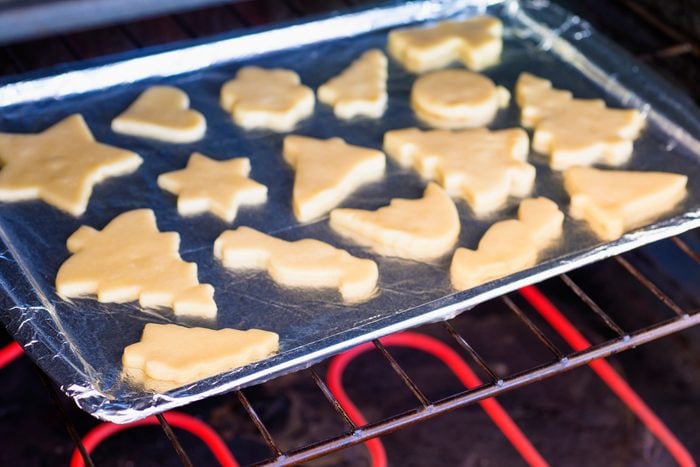 Westend61/Getty Images
Westend61/Getty Images Jumbo Brownie Cookies
Total Time: 35 minutes
Main Ingredients: Chocolate baking chips, chocolate chunks, butter, eggs, all-purpose flour
Level: Intermediate
Go to Recipe
Get your essential cookie-baking supplies ready to make these cookie recipes. Then, make these deeply fudgy cookies for any party or potluck—or just for you. The trick is adding a little espresso powder to the dough to really bring out the chocolate flavor.
Take these deeply fudgy cookies to a party, and you're sure to make a friend. A little espresso powder in the dough makes them over-the-top good. —Recipe contributor Rebecca Cababa, Las Vegas, Nevada
Jumbo Brownie Cookies
Total Time: 35 minutes
Main Ingredients: Chocolate baking chips, chocolate chunks, butter, eggs, all-purpose flour
Level: Intermediate
Go to Recipe
Get your essential cookie-baking supplies ready to make these cookie recipes. Then, make these deeply fudgy cookies for any party or potluck—or just for you. The trick is adding a little espresso powder to the dough to really bring out the chocolate flavor.
Take these deeply fudgy cookies to a party, and you're sure to make a friend. A little espresso powder in the dough makes them over-the-top good. —Recipe contributor Rebecca Cababa, Las Vegas, Nevada 